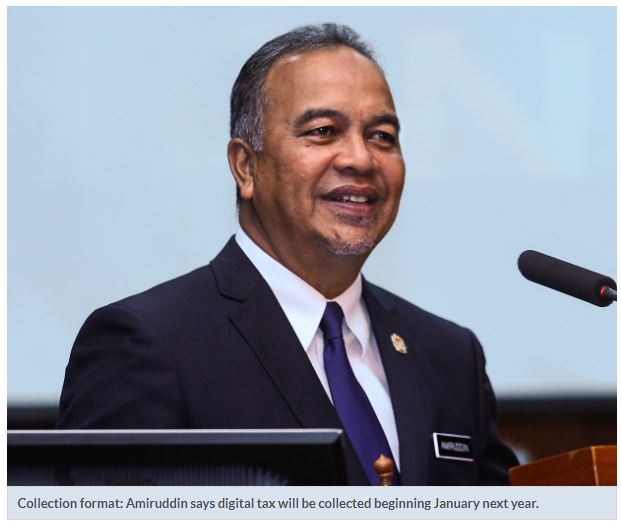Malaysia: Digital tax can rake in RM2.4bil a year
PETALING JAYA: Tax revenue could increase by more than RM2.4bil a year should foreign digital service providers register for the 6% service tax that is set to be implemented from Jan 1 next year.
“We are expecting the big boys to start registering with us. The registration (with the customs department) started yesterday and we will start collecting tax from next January onwards, ” said Deputy Finance Minister Datuk Amiruddin Hamzah during the opening ceremony of Tax Credit Camp in Bangi yesterday.
The amount collected from the digital tax could be more than RM2.4bil a year should all foreign digital service providers register for the digital service tax, said Veerinderjit Singh, who is the non-executive chairman of Axcelasia Taxand.
“Introduction of the digital tax is an attempt by the government to widen the tax base. The collection can be a substantial amount if all digital players register in Malaysia. The success of the implementation of the digital tax will depend on how many service providers register in the country, ” he said.
According to the Statistics Department’s survey on Malaysia’s e-commerce income, a tax rate of 6% could potentially have a collection of about RM2.4bil from the country’s e-commerce income estimated at RM398bil in 2015.
Last month, Lazada Malaysia said it is ready to embrace the digital tax and is working closely with the government on the tax.
Should the tech entities not abide with the taxation system of the country, Amiruddin cautioned that it would be detrimental to their corporate image.
“Foreign digital service providers are corporate responsible players in other countries and, in turn, they are similarly responsible to pay their dues in Malaysia, ” he said.
The tax would be imposed on various tech companies and e-commerce players such as Google, Amazon, Facebook, Spotify and Netflix Inc.
Among the countries that have imposed digital tax are Singapore, Japan, Australia, South Korea, New Zealand, Russia and Norway.
However, Veerinderjit pointed out that the tax collection could be dragged down by large tech giants avoiding tax payments as they have no physical presence in Malaysia.
“The government needs to persuade the tech players to do what is morally right. Government enforcement will play a key role to mitigate tax evaders, ” he stressed.
Generally, tech giants like Facebook and Google declare their profits in the country their headquarters are based, which can cause countries to lose potential tax revenue.
To ensure that foreign digital players register for the digital tax, Veerinderjit noted there needs to be more engagement between the custom authorities and the digital players.
Earlier this year, Amiruddin said when tabling the Service Tax (Amendment) 2019 Bill in parliament that the government has the power to enforce the law if the service providers are overseas as there is a government-to-government cooperation among countries under the Organisation for Economic Cooperation and Development.
Under the amended Service Tax 2019 Bill, tax defaulters can be fined up to RM50,000, imprisoned for up to three years, or both, upon conviction.
Moving forward, in the upcoming Budget 2020, Amiruddin disclosed that there would be no corporate or individual tax cut for next year.
Recently, Finance Minister Lim Guan Eng clarified that no new taxes would be introduced in the upcoming budget.
Budget 2020 would be tabled in parliament next week on Oct 11.
Meanwhile, he said the Inland Revenue Board (IRB) is on track to meet the tax collection target of around RM150bil by year-end, after posting a new record in direct tax collection last year.
In 2018, Malaysia’s gross direct tax collection increased by 11.13% to RM137.04bil, from RM123.31bil in 2017. This was a new record in direct tax collection since 2014.
Source: https://www.thestar.com.my/business/business-news/2019/10/02/digital-tax-can-rake-in-rm24bil-a-year#DkPBzA834PXvqr4B.99


 Thailand
Thailand




